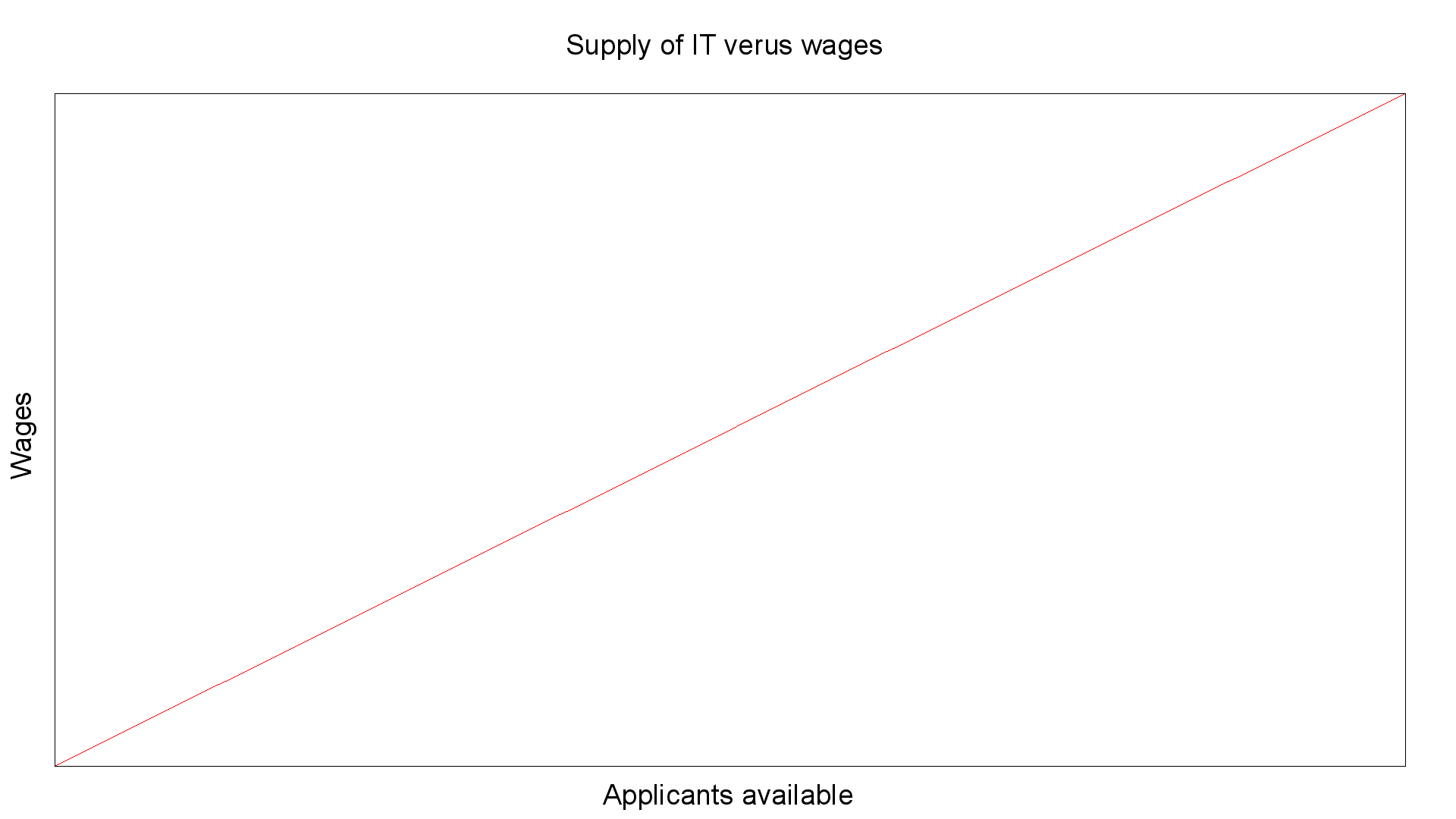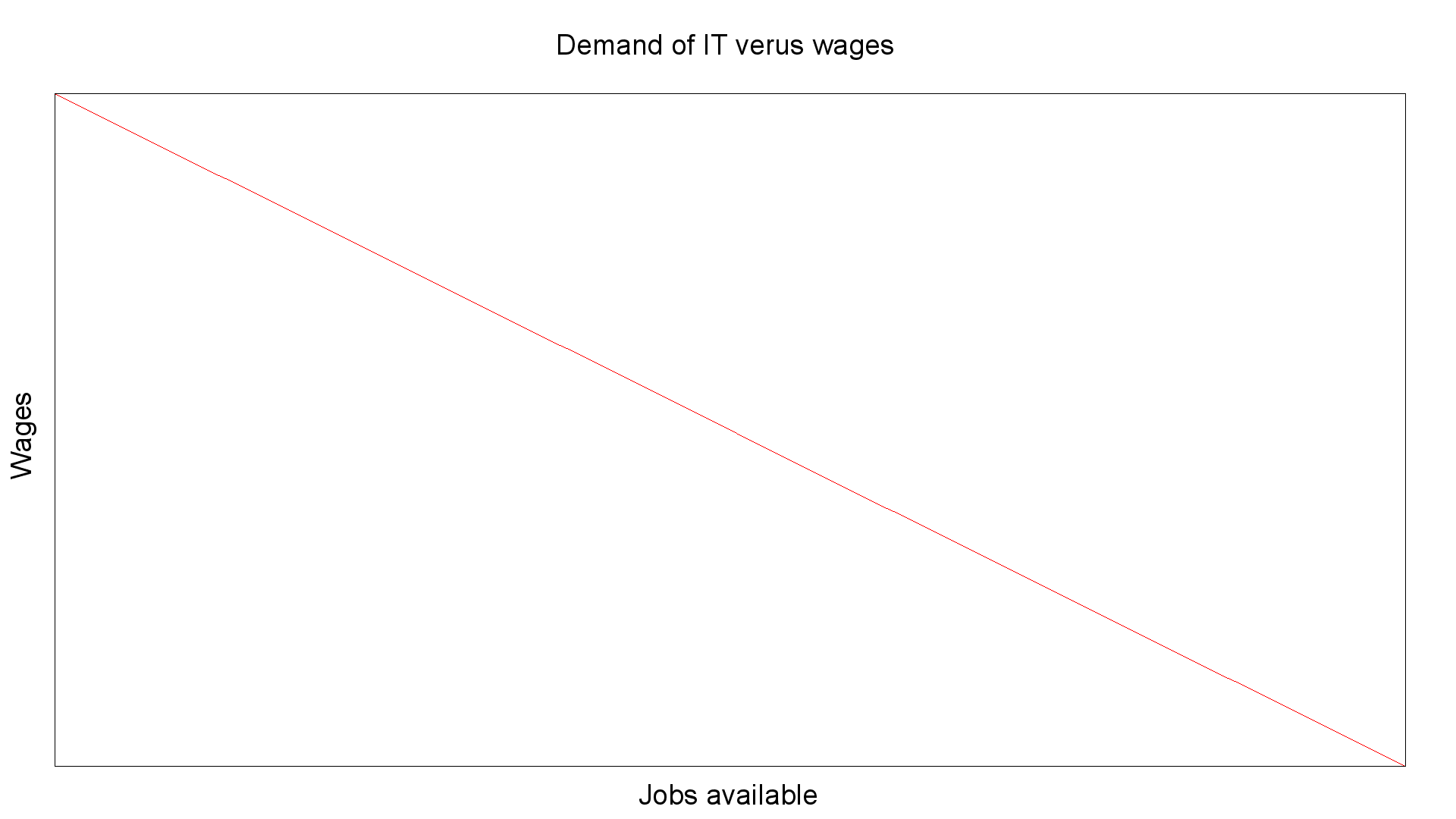President Obama is apparently planning on asking the Congress to allocate four billion dollars to increase the number of people who have access to computer science. This could be indeed a well intentioned plan to ensure that the most people possible have access to computer technology and are ready for new challenges for the new millennium.
If you are a cynical type, it could be a plan designed to pander to the large corporations who can never seem to get enough IT talent.
I am going assume a little of column A and little of column B. A normal supply and demand curve shows the number of IT people available over a range of compensation against the demand of companies of IT people at various levels of compensation.
The problem is not necessarily the supply of technical staff as much as the supply at the level that the corporations wish to pay.
Levels of compensation
The market will supply more people available by increasing the levels of compensation for the technical people.
Like magic, if technical degrees seem to be the ticket to well paying jobs, men and women will flock to the universities to get their degree. When the levels of compensation are higher, then the supply of available applicants goes up.
There are of course other reasons why the ranks of IT don’t always swell with people.
- expected to work longer/harder/evenings and don’t complain
- can be a solitary profession
- need to be available 24/7
- weekend work
These job attributes are not necessarily associated with every technology job but stereotypes exist because of the kernel of truth. These do accurately describe some tech positions depending on the type of job and the company who employs you.
These reasons will help to eliminate people or groups of people depending on their situation. These might not be much of a factor to recent graduates but it might to people slightly older or someone who has a family.
These factors actually may reduce the level of perceived compensation in the eyes of some applicants considering IT careers.
These attributes would be a form of negative compensation just on their own, but it doesn’t help when other factors or companies conspire to lower the compensation or keep it down. Yet, this type of direct influence isn’t the only way to keep wages down.
Legal exemptions
The cynic in me believes that perhaps a bit of lobbying was going on to exempt some of those tech workers fro the Fair Labor Standards Act.
The FLSA establishes minimum wage, overtime pay, recordkeeping, and youth employment standards affecting employees in the private sector and in Federal, State, and local governments.
It is obvious why companies would prefer to have a group of workers who they don’t have to pay overtime to. That isn’t to say that some companies don’t pay overtime, but if this little goodie is tucked into the law, a company would literally be a bit crazy to not take advantage of a legal method of keeping wage costs down.
H-1B Visa’s
The most market driven way to decrease the wages in general would be to somehow increase the number of IT specialists. The local developers and tech workers would never increase their numbers with the promise of lower compensation. There is actually a more direct way, simply import workers who can perform the jobs but do it in such a manner that they have less rights than a local worker. The H-1B visa is the answer.
- No automatic conversion to permanent residence status
- H-1B visa holders can be laid off at will
- company is able to discharge of an H-1B worker if the employer wishes to hire a U.S. worker
The extra bonus is that when the visa holder is discharged he is given 10 days to get a new valid visa or go home. These three points would form a pretty good incentive for the H-1B visa holder who wishes to remain the USA to keep in line.
These visas must be very popular as Microsoft [1] [2] [3], Intel [4] [5], Facebook [6], just to name a few companies are allegedly trying to get larger numbers of visas and to “reform” the visa system.
Is the H-1B visa program being used to get experts that are not available any other way, or this is just another way to get cheaper labor than is available locally.
Is there really a shortage
If you cannot find some IT talent for love nor money then there may be a shortage of available talent. The question of how do you decide what skills are needed for your positions. I just read an interesting piece from the IEEE which actually has an interesting view on the lack of tech workers.
To be honest, indeed when a language or technology becomes the hot commodity it can be difficult to find people with a lot of experience in that technology. However, the job description cannot be as follows.
Wanted senior software engineer, intimately familiar with Web Services, Fortran, Lisp, Eiffel, 6502 assembler and COBOL who is comfortable writing their own proprietary operating system that is scalable from the Atmel ATtiny13 up through a mainframe. Will require no assistance in our development environment and has 15 years experience as both a investment banker and gourmet chef.
Those people already work for you, perhaps your competition or don’t exist at all.
Perhaps President Obama is not necessarily focusing on the right goals for the future of IT. Perhaps the goals should be to remove the forces that distort the invisible hand of the market, rather than a half hearted attempt to encourage more people into the profession.
Wage fixing cartels
https://pando.com/2014/03/22/revealed-apple-and-googles-wage-fixing-cartel-involved-dozens-more-companies-over-one-million-employees/
Text of the Computer Professionals Update Act
https://www.govtrack.us/congress/bills/112/s1747/text#
Overly high expectations when looking for candidates
http://spectrum.ieee.org/podcast/at-work/tech-careers/why-bad-jobsor-no-jobshappen-to-good-workers
The uses and abuses of H-1B visa’s
http://www.cringely.com/2012/10/23/what-americans-dont-know-about-h-1b-visas-could-hurt-us-all/





